Just don't send them to government land is SA...
Saving Private Rhino: We must reimagine the future of species conservation in South Africa
- Richprins
- Committee Member
- Posts: 74923
- Joined: Sat May 19, 2012 3:52 pm
- Location: NELSPRUIT
- Contact:
Re: Saving Private Rhino: We must reimagine the future of species conservation in South Africa
Hope it works! 
Just don't send them to government land is SA...
Just don't send them to government land is SA...
Please check Needs Attention pre-booking: https://africawild-forum.com/viewtopic.php?f=322&t=596
- Lisbeth
- Site Admin
- Posts: 65409
- Joined: Sat May 19, 2012 12:31 pm
- Country: Switzerland
- Location: Lugano
- Contact:
Re: Saving Private Rhino: We must reimagine the future of species conservation in South Africa
I doubt it  They only own parks outside SA as far as I know
They only own parks outside SA as far as I know 
"Education is the most powerful weapon which you can use to change the world." Nelson Mandela
The desire for equality must never exceed the demands of knowledge
The desire for equality must never exceed the demands of knowledge
- Lisbeth
- Site Admin
- Posts: 65409
- Joined: Sat May 19, 2012 12:31 pm
- Country: Switzerland
- Location: Lugano
- Contact:
Re: Saving Private Rhino: We must reimagine the future of species conservation in South Africa
Four African nations line up to ‘rewild’ massive herd of ‘homeless’ South African rhinos
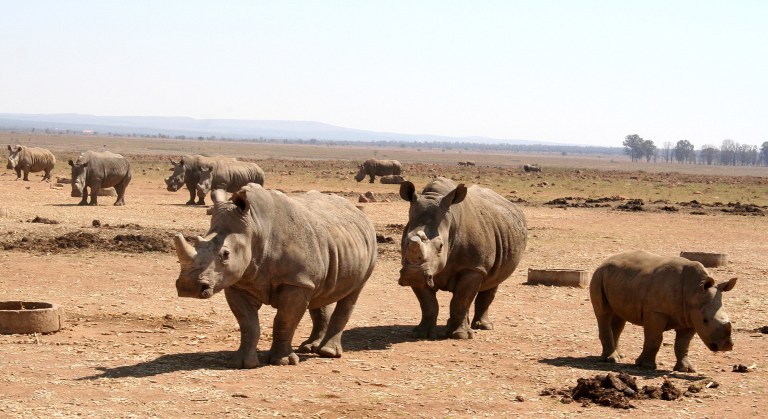
A small part of the 2,000 rhinos at John Hume’s former rhino ranch in North West. (Photo: Tony Carnie)
By Tony Carnie | 12 Sep 2023
In what will likely be the world’s largest mass translocation of rhinos, conservation groups are planning to move 300 rhinos a year for the next 10 years to locations across South Africa and elsewhere on the rest of the continent.
____________________________________________________________________________________________________________________________
Conservation groups in at least four African nations (Namibia, Zimbabwe, Zambia and Kenya) have offered to “rewild” the first contingent of up to 3,000 South African rhinos — an operation shaping up to be the world’s largest mass translocation of this increasingly threatened species.
Just short of 2,000 rhinos — previously owned by private rhino rancher John Hume — were purchased recently by the Johannesburg-based African Parks non-profit conservation group with funding from anonymous philanthropists. This came after Hume ran out of money to feed and protect his private herd, but drew no bidders at an auction earlier this year.
As this number of rhinos cannot be moved immediately en masse, Hume’s former herd of semi-wild rhinos is expected to keep growing to reach as many as 3,000 over the next decade while African Parks attempts to find new habitats that are secure and ecologically suitable within South Africa and other parts of the continent.
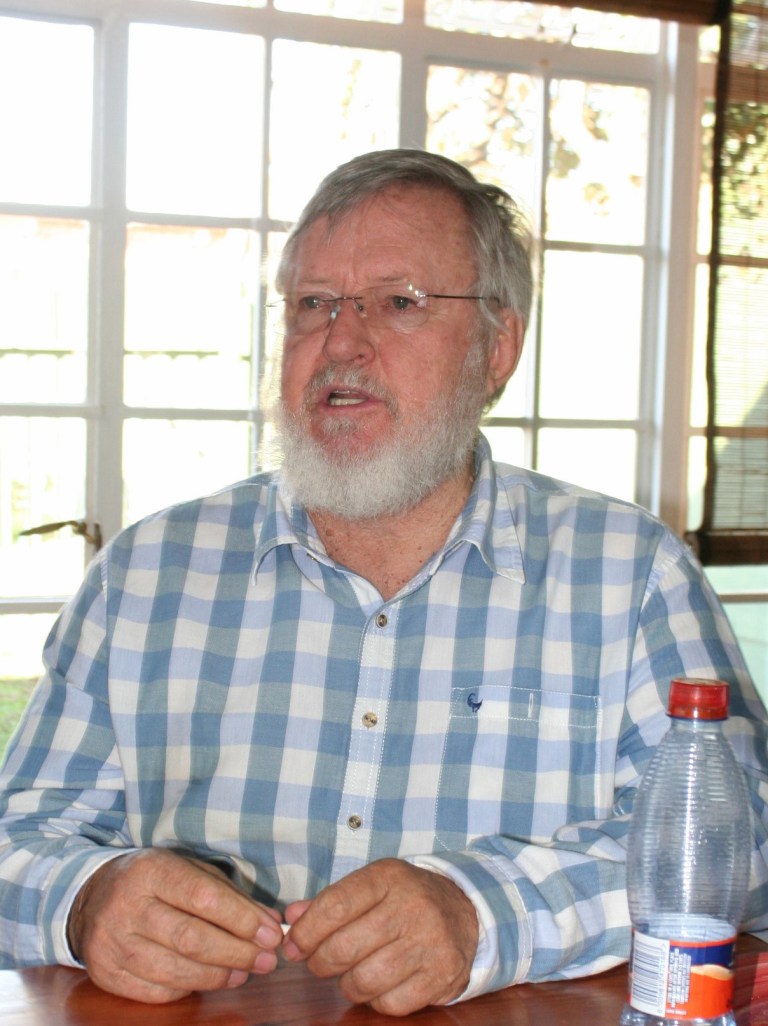
John Hume, who built up a private herd of 2,000 rhinos, but was forced to sell them this month when he ran out of money to sustain them. (Photo: Tony Carnie)
African Parks’ chief executive, Peter Fearnhead, has likened the coming moves to a second “Operation Rhino”, reminiscent of the pioneering 1960s initiative by the former Natal Parks Board to translocate some of the last surviving populations of southern white rhinos to other wildlife sanctuaries in South Africa and further afield.
While accurate records are not available, veteran KwaZulu-Natal conservationist Dave Cook has estimated that somewhere around 1,200 rhinos were donated or sold over about three decades as part of Operation Rhino, mainly to restock the Kruger National Park and other wildlife reserves where the species had been driven to extinction.
Since then, many of these populations have been bludgeoned by international horn poaching syndicates.
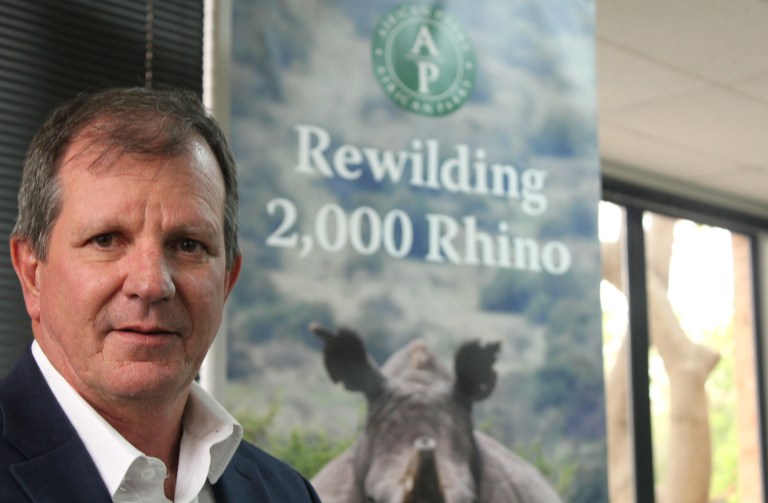
African Parks chief executive Peter Fearnhead speaks at a media briefing in Johannesburg on 12 September 2023.(Photo: Tony Carnie)
“We would like to establish multiple large white rhino populations across Africa,” said Fearnhead, as a means of ensuring that this valuable pool of rhino “eggs” were not kept in a single basket.
At a media briefing in Johannesburg on September 12, Fearnhead emphasised that his organisation was determined to ensure the safety and survival of the animals and would appoint an advisory committee of rhino experts from South Africa and other parts of the continent to guide the rewilding process to suitable destinations.
“We are responsible to the public, to funders and governments, so we also have to be clear that there will be challenges and mistakes ahead — but we want to minimise the risks as far as possible.”
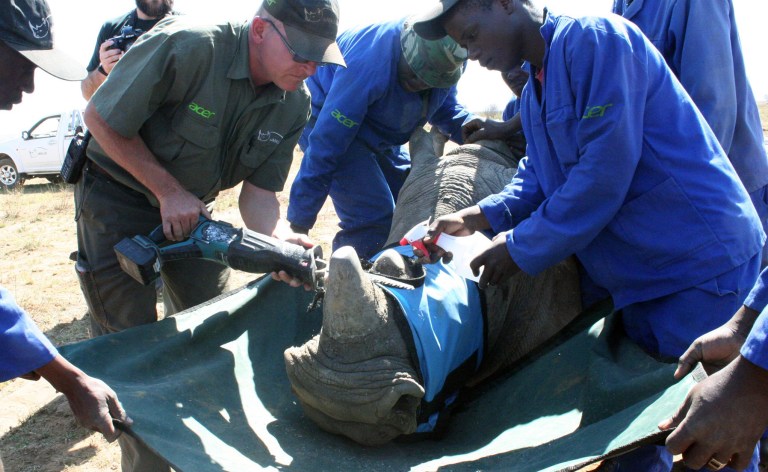
Staff at the Platinum Rhino ranch dehorn a rhino to deter poachers. (Photo: Tony Carnie)
Founder populations
Fearnhead said the organisation’s preliminary vision was to move at least 300 rhinos every year for the next 10 years to re-establish somewhere between seven and 20 large founder populations of rhinos both domestically and in other parts of Africa where white rhinos once lived.
“We would love it for South Africa to be at least part of the solution [in rewilding Hume’s former herd] and there has already been quite a lot of interest from parties within South Africa,” he said, adding that there had also been expressions of interest from Namibia, Zimbabwe, Zambia and Kenya.
Subsequent destinations could include Mozambique, the Democratic Republic of the Congo and Rwanda — and possibly former southern and northern rhino range states such as Uganda, South Sudan and the Central African Republic.
African Parks already manages 22 protected wildlife reserves in several African nations in a combined area exceeding 20 million hectares (10 times larger than South Africa’s flagship Kruger National Park).
Fearnhead would neither be drawn on how much African Parks had paid Hume to acquire his 1,998 rhinos or his 8,500 hectare Platinum Dreams rhino ranch in North West — nor the identity of private donors or philanthropists who had funded the initial purchase cost of the rhinos, the land and the first year of operational costs.
However, it was likely that African Parks would now have to partner with several other conservation organisations because of the massive costs of protecting the newly acquired herd and then shifting it across the country and continent.
Fearnhead said African Parks had felt a “moral imperative” to act swiftly to secure the future of Hume’s rhinos because of their valuable genetic pool — but it was now necessary to source more funding with the assistance of other conservation groups.
In the short term, African Parks would assume ownership of the rhinos and ranch later this week, along with the entire complement of conservation managers, security personnel, veterinarians and other staff at the Platinum Rhino ranch.
He would not comment on the future of Hume’s massive stockpile of rhino horns — built up over the last three decades from natural mortalities or dehorning — other than to say that the stockpiled horns did not form part of the African Parks transaction.
Questioned about the viability of “rewilding” up to 3,000 rhinos, most of them born in a semi-captive captive environment, Fearnhead said he did not foresee “huge problems”, provided that suitable habitats could be found and that the animals were monitored closely after translocation.
Nevertheless, previous translocations into several parts of Africa by the former Natal Parks Board and other agencies have failed due to the rampant wave of horn poaching across the continent.
Can their safety now be secured in the absence of intensive and long-term “fortress conservation” measures?
“What’s exciting is that several governments want to be part of the solution,” Fearnhead responded.
“They want wildlife conservation projects to succeed … and ‘fortress conservation’ is as much a question of making local communities part of that fortress.” DM

A small part of the 2,000 rhinos at John Hume’s former rhino ranch in North West. (Photo: Tony Carnie)
By Tony Carnie | 12 Sep 2023
In what will likely be the world’s largest mass translocation of rhinos, conservation groups are planning to move 300 rhinos a year for the next 10 years to locations across South Africa and elsewhere on the rest of the continent.
____________________________________________________________________________________________________________________________
Conservation groups in at least four African nations (Namibia, Zimbabwe, Zambia and Kenya) have offered to “rewild” the first contingent of up to 3,000 South African rhinos — an operation shaping up to be the world’s largest mass translocation of this increasingly threatened species.
Just short of 2,000 rhinos — previously owned by private rhino rancher John Hume — were purchased recently by the Johannesburg-based African Parks non-profit conservation group with funding from anonymous philanthropists. This came after Hume ran out of money to feed and protect his private herd, but drew no bidders at an auction earlier this year.
As this number of rhinos cannot be moved immediately en masse, Hume’s former herd of semi-wild rhinos is expected to keep growing to reach as many as 3,000 over the next decade while African Parks attempts to find new habitats that are secure and ecologically suitable within South Africa and other parts of the continent.

John Hume, who built up a private herd of 2,000 rhinos, but was forced to sell them this month when he ran out of money to sustain them. (Photo: Tony Carnie)
African Parks’ chief executive, Peter Fearnhead, has likened the coming moves to a second “Operation Rhino”, reminiscent of the pioneering 1960s initiative by the former Natal Parks Board to translocate some of the last surviving populations of southern white rhinos to other wildlife sanctuaries in South Africa and further afield.
While accurate records are not available, veteran KwaZulu-Natal conservationist Dave Cook has estimated that somewhere around 1,200 rhinos were donated or sold over about three decades as part of Operation Rhino, mainly to restock the Kruger National Park and other wildlife reserves where the species had been driven to extinction.
Since then, many of these populations have been bludgeoned by international horn poaching syndicates.

African Parks chief executive Peter Fearnhead speaks at a media briefing in Johannesburg on 12 September 2023.(Photo: Tony Carnie)
“We would like to establish multiple large white rhino populations across Africa,” said Fearnhead, as a means of ensuring that this valuable pool of rhino “eggs” were not kept in a single basket.
At a media briefing in Johannesburg on September 12, Fearnhead emphasised that his organisation was determined to ensure the safety and survival of the animals and would appoint an advisory committee of rhino experts from South Africa and other parts of the continent to guide the rewilding process to suitable destinations.
“We are responsible to the public, to funders and governments, so we also have to be clear that there will be challenges and mistakes ahead — but we want to minimise the risks as far as possible.”

Staff at the Platinum Rhino ranch dehorn a rhino to deter poachers. (Photo: Tony Carnie)
Founder populations
Fearnhead said the organisation’s preliminary vision was to move at least 300 rhinos every year for the next 10 years to re-establish somewhere between seven and 20 large founder populations of rhinos both domestically and in other parts of Africa where white rhinos once lived.
“We would love it for South Africa to be at least part of the solution [in rewilding Hume’s former herd] and there has already been quite a lot of interest from parties within South Africa,” he said, adding that there had also been expressions of interest from Namibia, Zimbabwe, Zambia and Kenya.
Subsequent destinations could include Mozambique, the Democratic Republic of the Congo and Rwanda — and possibly former southern and northern rhino range states such as Uganda, South Sudan and the Central African Republic.
African Parks already manages 22 protected wildlife reserves in several African nations in a combined area exceeding 20 million hectares (10 times larger than South Africa’s flagship Kruger National Park).
Fearnhead would neither be drawn on how much African Parks had paid Hume to acquire his 1,998 rhinos or his 8,500 hectare Platinum Dreams rhino ranch in North West — nor the identity of private donors or philanthropists who had funded the initial purchase cost of the rhinos, the land and the first year of operational costs.
However, it was likely that African Parks would now have to partner with several other conservation organisations because of the massive costs of protecting the newly acquired herd and then shifting it across the country and continent.
Fearnhead said African Parks had felt a “moral imperative” to act swiftly to secure the future of Hume’s rhinos because of their valuable genetic pool — but it was now necessary to source more funding with the assistance of other conservation groups.
In the short term, African Parks would assume ownership of the rhinos and ranch later this week, along with the entire complement of conservation managers, security personnel, veterinarians and other staff at the Platinum Rhino ranch.
He would not comment on the future of Hume’s massive stockpile of rhino horns — built up over the last three decades from natural mortalities or dehorning — other than to say that the stockpiled horns did not form part of the African Parks transaction.
Questioned about the viability of “rewilding” up to 3,000 rhinos, most of them born in a semi-captive captive environment, Fearnhead said he did not foresee “huge problems”, provided that suitable habitats could be found and that the animals were monitored closely after translocation.
Nevertheless, previous translocations into several parts of Africa by the former Natal Parks Board and other agencies have failed due to the rampant wave of horn poaching across the continent.
Can their safety now be secured in the absence of intensive and long-term “fortress conservation” measures?
“What’s exciting is that several governments want to be part of the solution,” Fearnhead responded.
“They want wildlife conservation projects to succeed … and ‘fortress conservation’ is as much a question of making local communities part of that fortress.” DM
"Education is the most powerful weapon which you can use to change the world." Nelson Mandela
The desire for equality must never exceed the demands of knowledge
The desire for equality must never exceed the demands of knowledge
- Lisbeth
- Site Admin
- Posts: 65409
- Joined: Sat May 19, 2012 12:31 pm
- Country: Switzerland
- Location: Lugano
- Contact:
Re: Saving Private Rhino: We must reimagine the future of species conservation in South Africa
ANALYSIS
Conserving and rewilding John Hume’s rhinos may cost R1bn or more
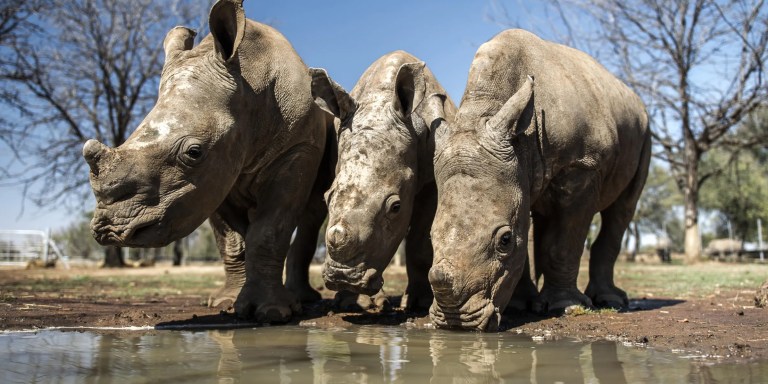
Rhinos at John Hume’s farm in North West. (Photo: Gallo Images / Rapport / Conrad Bornman)
By Ed Stoddard | 12 Sep 2023
The purchase of pachyderm patriarch John Hume’s 2,000 white rhinos and his breeding project by African Parks for an undisclosed sum was likely just the tip of the expenditure iceberg. Maintaining the project and gradually translocating the animals over the next decade could conceivably cost up to or even more than R1bn.
__________________________________________________________________________________________________________________
When it comes to the economics of megafauna, megabucks are also involved.
Non-government organisation African Parks last week announced that it had bought wildlife tycoon John Hume’s 2,000 white rhinos – the world’s largest privately owned population of the pachyderms – and the 8,500-hectare property they roam on for an undisclosed sum.
By stepping up the plate, the NGO threw a lifeline to about 8% of the world’s rhino population (including all species) after an online auction with a minimum bidding price of $10-million failed to attract a single bid.
At a media briefing on Tuesday at African Parks’ offices in the Joburg suburb of Bryanston, CEO Peter Fearnhead said the donors who had come forward to make the transaction possible had requested anonymity and that the amount paid to Hume not be disclosed.
It’s probably safe to say that the purchase price was at least R100-million as the transaction required regulatory approval from, of all things, the Competition Commission.
R100-million is the “minimum asset value of the transferred/target firm” that requires such approval. But one reckons that Hume wouldn’t have settled for anything less than the $10-million minimum bid he had sought. In other words, R190-million.
The purchase price is almost certainly the tip of the expenditure iceberg and the NGO will need donors to keep opening their wallets.
Hume’s daughter-in-law, Tammy, said earlier this year that maintaining the breeding project came at a cost of R54-million a year. This includes a state-of-the-art security system that has thwarted poachers, with the last poaching incident recorded on the ranch in 2017.
Running costs of R54-million a year come to R540-million over a decade – and that’s not counting inflation. Estimating how much costs will rise over the next decade is really a thumbsuck, but you can bet a bakkie-load of rhino horn that costs are going to go north. A conservative guess will be that the operational costs will run between R650-million and R700-million over the next 10 years.
Hume, who claims he has spent over the decades about $150-million (close to R3-billion) on the project, including the purchase of rhinos, was running out of the funds needed to keep things running.
Rewilding costs
Then there are the rewilding costs, which will also be jumbo.
For starters, it’s not 2,000 rhinos that are expected to be translocated, but 3,000. This is, after all, a breeding project and the herd will keep reproducing. So the aim is to “rewild” – which effectively means reintroducing species to former ranges and habitats: 300 rhinos a year for 10 years.
Fearnhead provided journalists with a breakdown of costs – a lot depends on the distances involved. In South Africa, to dart, capture and move a rhino costs $1,500 a pop, or about R28,500 at the current exchange rate.
To move an animal overland in the region – to, say, Botswana – raises the costs to around $5,250, about R100,000.
The costs really soar if the relocation destination is, say, the DRC or Chad. When aircraft are involved, the costs are around $50,000 per animal, about R950,000. That’s a lot of first-class seats in one go.
So, hypothetically, if 1,250 of the animals were relocated to domestic reserves, 1,250 to neighbouring states, and 500 were airlifted north of the equator, the costs, according to this correspondent’s calculations, would be over $33-million – about R630-million.
That amount, of course, is also subject to inflation and will depend on how the animals are distributed, but sprinkling 1,250 around South Africa – the least costly option – is a doubtful option at present in the face of the poaching crisis.
There is virtually no state-run park in South Africa that is currently suitable for rhino relocations. About 8,000 rhinos, or 60% of the national herd, are in private hands – including Hume’s which now belong to African Parks – and a key factor behind this trend has been the mounting losses to poaching in state-run parks, notably the Kruger.
The private sector in SA last year had only 20% of the rhinos poached for their horns, while state reserves – which hold only 40% of the animals – accounted for 80% of the toll.
KwaZulu-Natal’s state parks have become the focus of the carnage as its provincial wildlife agency falls apart under the combined weight of mismanagement and corruption.
While private rhino owners have done a far better job of protecting their assets, soaring security costs have driven smaller players out of the game, leading to a concentration of ownership.
Hume’s herd was the biggest example on that front, but it will now gradually be whittled down, and there are not many big owners with the capacity to protect a growing rhino population.
Fearnhead told Daily Maverick in an interview that African Parks had received expressions of interest from both private and state reserves in South Africa for animals from Hume’s herd. But demand from the private sector is unlikely to reach the hypothetical 1,250 outlined above.
Security will, of course, also be a concern north of the Limpopo for any translocated populations.
The bottom line is that this is at least a R1-billion baby plus plenty of change, and, like a rhino calf, it can grow a lot bigger. DM
Conserving and rewilding John Hume’s rhinos may cost R1bn or more

Rhinos at John Hume’s farm in North West. (Photo: Gallo Images / Rapport / Conrad Bornman)
By Ed Stoddard | 12 Sep 2023
The purchase of pachyderm patriarch John Hume’s 2,000 white rhinos and his breeding project by African Parks for an undisclosed sum was likely just the tip of the expenditure iceberg. Maintaining the project and gradually translocating the animals over the next decade could conceivably cost up to or even more than R1bn.
__________________________________________________________________________________________________________________
When it comes to the economics of megafauna, megabucks are also involved.
Non-government organisation African Parks last week announced that it had bought wildlife tycoon John Hume’s 2,000 white rhinos – the world’s largest privately owned population of the pachyderms – and the 8,500-hectare property they roam on for an undisclosed sum.
By stepping up the plate, the NGO threw a lifeline to about 8% of the world’s rhino population (including all species) after an online auction with a minimum bidding price of $10-million failed to attract a single bid.
At a media briefing on Tuesday at African Parks’ offices in the Joburg suburb of Bryanston, CEO Peter Fearnhead said the donors who had come forward to make the transaction possible had requested anonymity and that the amount paid to Hume not be disclosed.
It’s probably safe to say that the purchase price was at least R100-million as the transaction required regulatory approval from, of all things, the Competition Commission.
R100-million is the “minimum asset value of the transferred/target firm” that requires such approval. But one reckons that Hume wouldn’t have settled for anything less than the $10-million minimum bid he had sought. In other words, R190-million.
The purchase price is almost certainly the tip of the expenditure iceberg and the NGO will need donors to keep opening their wallets.
Hume’s daughter-in-law, Tammy, said earlier this year that maintaining the breeding project came at a cost of R54-million a year. This includes a state-of-the-art security system that has thwarted poachers, with the last poaching incident recorded on the ranch in 2017.
Running costs of R54-million a year come to R540-million over a decade – and that’s not counting inflation. Estimating how much costs will rise over the next decade is really a thumbsuck, but you can bet a bakkie-load of rhino horn that costs are going to go north. A conservative guess will be that the operational costs will run between R650-million and R700-million over the next 10 years.
Hume, who claims he has spent over the decades about $150-million (close to R3-billion) on the project, including the purchase of rhinos, was running out of the funds needed to keep things running.
Rewilding costs
Then there are the rewilding costs, which will also be jumbo.
For starters, it’s not 2,000 rhinos that are expected to be translocated, but 3,000. This is, after all, a breeding project and the herd will keep reproducing. So the aim is to “rewild” – which effectively means reintroducing species to former ranges and habitats: 300 rhinos a year for 10 years.
Fearnhead provided journalists with a breakdown of costs – a lot depends on the distances involved. In South Africa, to dart, capture and move a rhino costs $1,500 a pop, or about R28,500 at the current exchange rate.
To move an animal overland in the region – to, say, Botswana – raises the costs to around $5,250, about R100,000.
The costs really soar if the relocation destination is, say, the DRC or Chad. When aircraft are involved, the costs are around $50,000 per animal, about R950,000. That’s a lot of first-class seats in one go.
So, hypothetically, if 1,250 of the animals were relocated to domestic reserves, 1,250 to neighbouring states, and 500 were airlifted north of the equator, the costs, according to this correspondent’s calculations, would be over $33-million – about R630-million.
That amount, of course, is also subject to inflation and will depend on how the animals are distributed, but sprinkling 1,250 around South Africa – the least costly option – is a doubtful option at present in the face of the poaching crisis.
There is virtually no state-run park in South Africa that is currently suitable for rhino relocations. About 8,000 rhinos, or 60% of the national herd, are in private hands – including Hume’s which now belong to African Parks – and a key factor behind this trend has been the mounting losses to poaching in state-run parks, notably the Kruger.
The private sector in SA last year had only 20% of the rhinos poached for their horns, while state reserves – which hold only 40% of the animals – accounted for 80% of the toll.
KwaZulu-Natal’s state parks have become the focus of the carnage as its provincial wildlife agency falls apart under the combined weight of mismanagement and corruption.
While private rhino owners have done a far better job of protecting their assets, soaring security costs have driven smaller players out of the game, leading to a concentration of ownership.
Hume’s herd was the biggest example on that front, but it will now gradually be whittled down, and there are not many big owners with the capacity to protect a growing rhino population.
Fearnhead told Daily Maverick in an interview that African Parks had received expressions of interest from both private and state reserves in South Africa for animals from Hume’s herd. But demand from the private sector is unlikely to reach the hypothetical 1,250 outlined above.
Security will, of course, also be a concern north of the Limpopo for any translocated populations.
The bottom line is that this is at least a R1-billion baby plus plenty of change, and, like a rhino calf, it can grow a lot bigger. DM
"Education is the most powerful weapon which you can use to change the world." Nelson Mandela
The desire for equality must never exceed the demands of knowledge
The desire for equality must never exceed the demands of knowledge
- Richprins
- Committee Member
- Posts: 74923
- Joined: Sat May 19, 2012 3:52 pm
- Location: NELSPRUIT
- Contact:
Re: Saving Private Rhino: We must reimagine the future of species conservation in South Africa
Good news all round! 
 Lis!
Lis!
Please check Needs Attention pre-booking: https://africawild-forum.com/viewtopic.php?f=322&t=596
- Lisbeth
- Site Admin
- Posts: 65409
- Joined: Sat May 19, 2012 12:31 pm
- Country: Switzerland
- Location: Lugano
- Contact:
Re: Saving Private Rhino: We must reimagine the future of species conservation in South Africa
"Education is the most powerful weapon which you can use to change the world." Nelson Mandela
The desire for equality must never exceed the demands of knowledge
The desire for equality must never exceed the demands of knowledge
- Richprins
- Committee Member
- Posts: 74923
- Joined: Sat May 19, 2012 3:52 pm
- Location: NELSPRUIT
- Contact:
Re: Saving Private Rhino: We must reimagine the future of species conservation in South Africa
Daily Maverick
·
Last year, African Parks bought 2,000 semi-wild white rhinos, starting a massive rewilding effort. Now, their Rhino Rewild initiative has relocated 120 southern white rhinos to private reserves near Kruger National Park, the first such reintroduction in 50 years.
This is your chance to engage with the experts who know first-hand about the rewilding experience.
https://events.dailymaverick.co.za
Please check Needs Attention pre-booking: https://africawild-forum.com/viewtopic.php?f=322&t=596
- Lisbeth
- Site Admin
- Posts: 65409
- Joined: Sat May 19, 2012 12:31 pm
- Country: Switzerland
- Location: Lugano
- Contact:
Re: Saving Private Rhino: We must reimagine the future of species conservation in South Africa
Must try to remember to watch the webinar. During the webinars, you can also pose questions. If they are relevant and interesting you might even get an answer 
"Education is the most powerful weapon which you can use to change the world." Nelson Mandela
The desire for equality must never exceed the demands of knowledge
The desire for equality must never exceed the demands of knowledge
- Richprins
- Committee Member
- Posts: 74923
- Joined: Sat May 19, 2012 3:52 pm
- Location: NELSPRUIT
- Contact:
Re: Saving Private Rhino: We must reimagine the future of species conservation in South Africa
Please check Needs Attention pre-booking: https://africawild-forum.com/viewtopic.php?f=322&t=596


